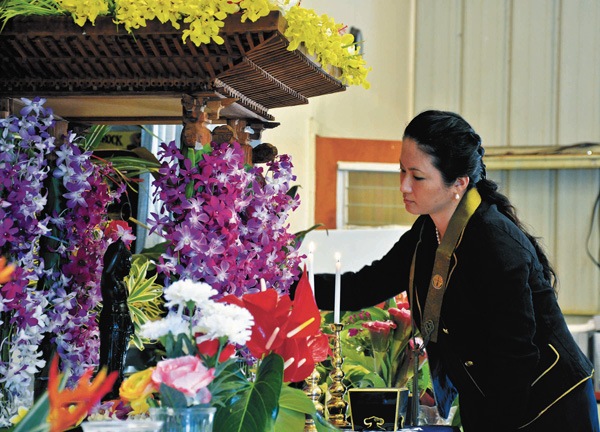HANAPEPE — Are you happy? Rev. Kosen Ishikawa of The Koloa Jodo Mission wanted to know Sunday at the Kauai Soto Zen Temple in Hanapepe. Several hundred people gathered for the annual Hanamatsuri, or Buddha Day Service, hosted by the
HANAPEPE — Are you happy?
Rev. Kosen Ishikawa of The Koloa Jodo Mission wanted to know Sunday at the Kauai Soto Zen Temple in Hanapepe. Several hundred people gathered for the annual Hanamatsuri, or Buddha Day Service, hosted by the Kauai Buddhist Council.
Buddha Day celebrates the birth of the Buddha on the eighth day of the fourth month — actually today — nearly 2,500 years ago in the Lumbini Gardens in what is now Nepal.
“This is a great day,” Ishikawa said. “The prince arrived to find the way to end suffering, and if you are not happy, today is a great day to learn to be happy.”
Synonymous with Hanamatsuri, translated to mean “flower, or spring festival,” symbolic presentations of flowers and the pouring of sweet tea over a small statue of the Buddha enshrined in a hanamido, or floral structure, represented the abundance of flowers in bloom at Lumbini Garden when the prince was born.
Gerald Hirata, delivering the keynote “What does it mean to be a Buddhist?” message, said there are people who are born into Buddhism, and there are people who come to Buddhism.
In discussing the lay perspective of Buddhism with people in the community, he realized that people who were born into the religion took longer to respond, while those who entered the religion readily answered the question.
On the contrary, Hirata said people coming into Buddhism have a good understanding because they have read the doctrines.
“I go to church because when I was in preschool, we would visit Rev. Kondo,” said Taylor Ishimoto of the Lihue Hongwanji Mission. “I thought it would be nice to visit Rev. Kondo in church and I started going with my grandmother.”
She said she was sad when the reverend was about to leave, but he persuaded her to continue to visit the church.
“The church is like my second family,” Ishimoto said. “It has given me opportunities to do different things like going to Oahu for Dharma school. We try our hardest to be kind and get along with the world. Today, we celebrate Buddha’s birth because we follow his teachings.”
Ishikawa said the prince, before embarking on his journey to find the cause of suffering, had everything — a wife, wealth, social position and more.
He left that behind and following six years of contemplating the reason for suffering, said the cause of suffering is blind passion and the cure is to choose the middle path.
“What the Buddha preached 2,500 years ago is still being practiced by more than 84,000 people throughout the world, including here in Hawaii,” Ishikawa said. “His words to happiness is to live harmoniously with all living things, and to help others to be happy.”


